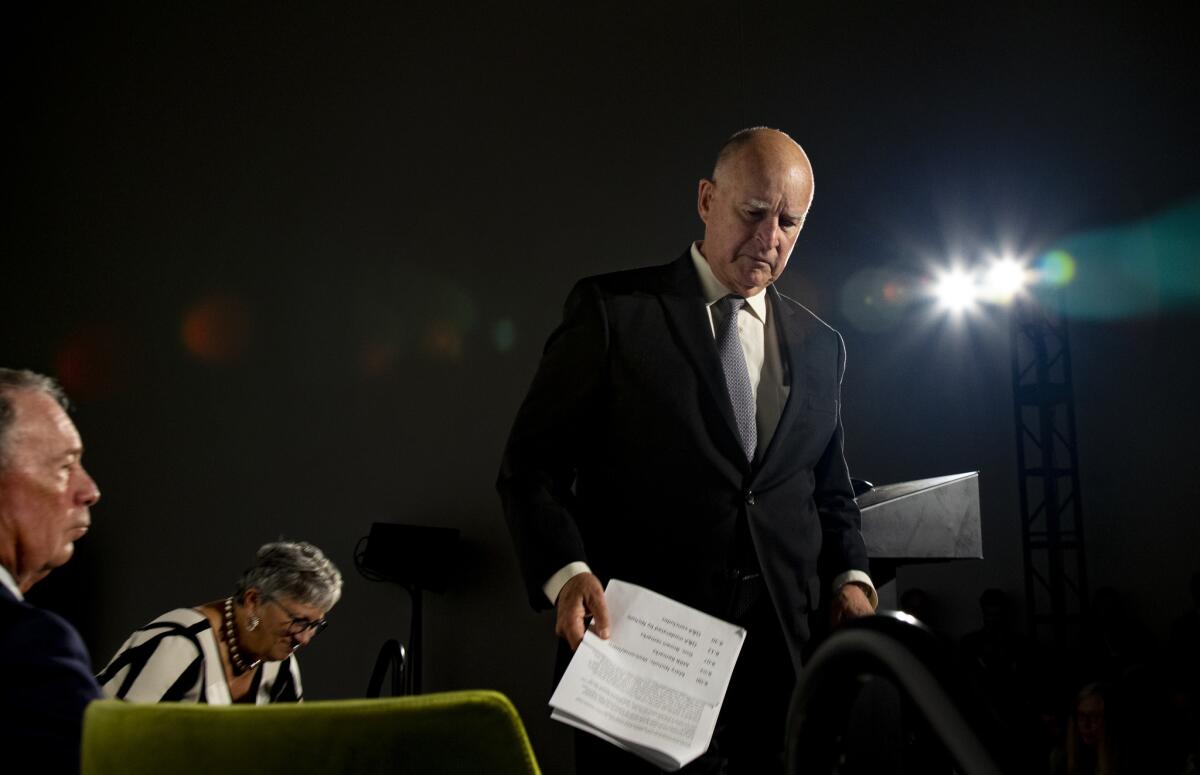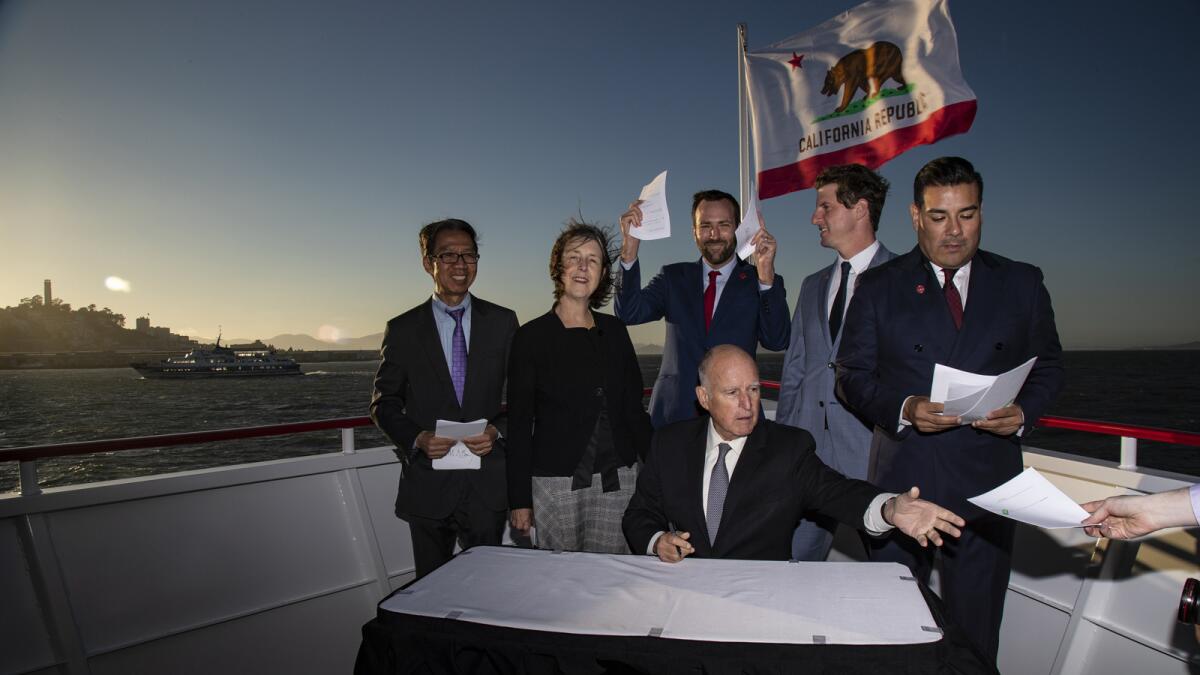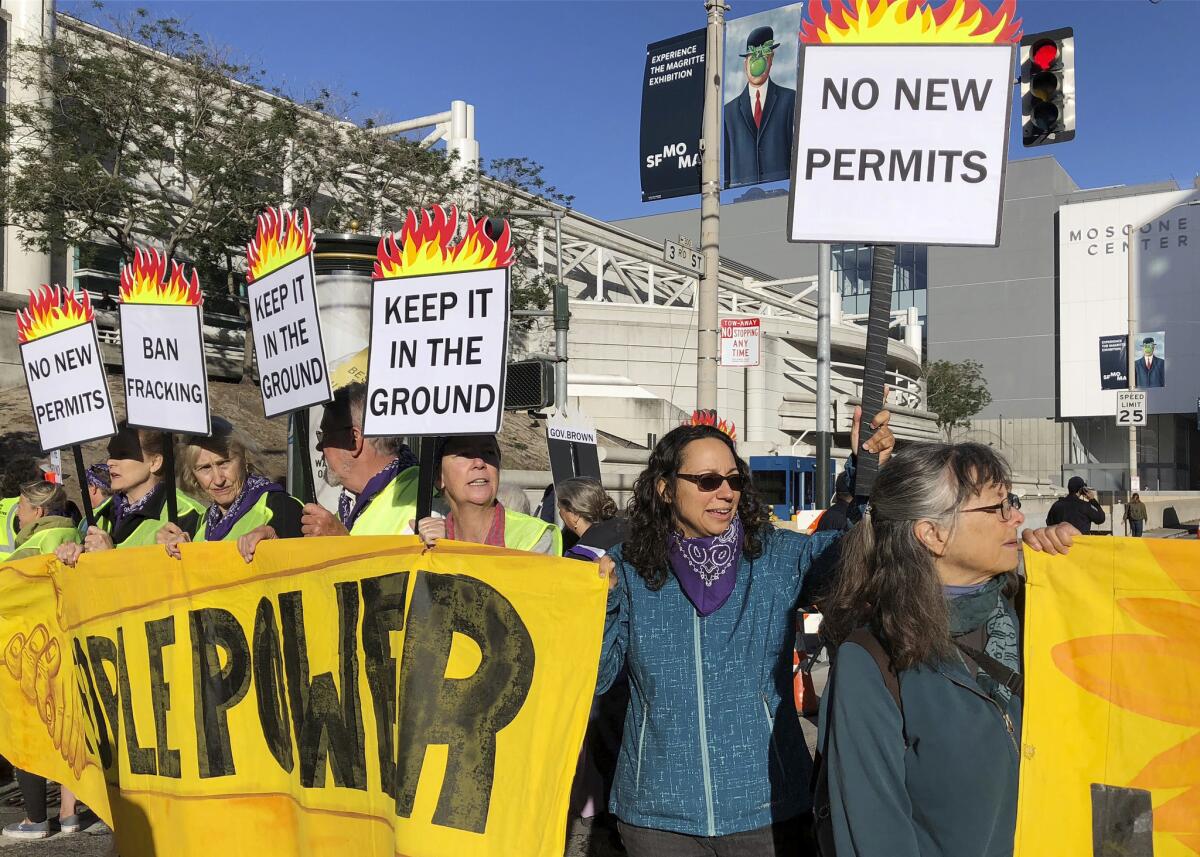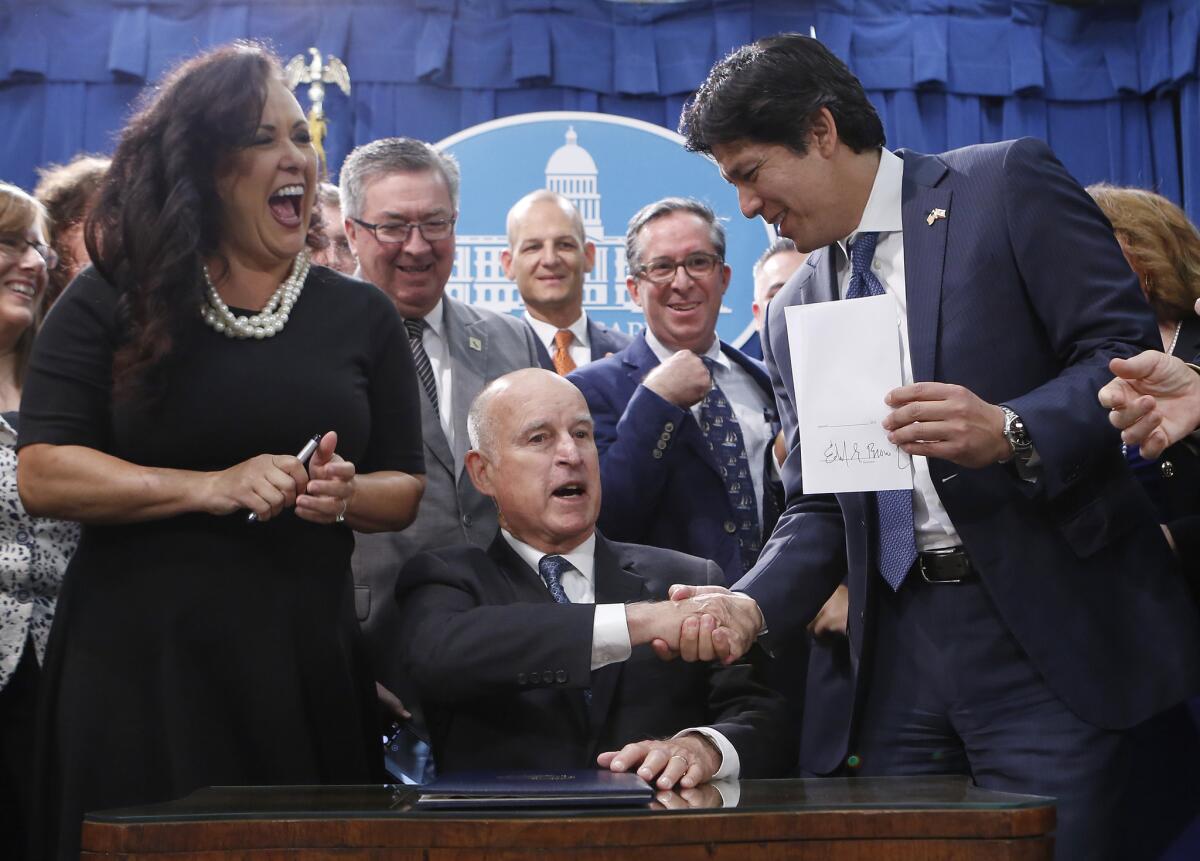Gov. Jerry Brown’s three-day environmental summit in San Francisco kicked off on Wednesday, bringing together political leaders from around the world.
The event will test whether California can bring the country to a place Congress and the White House won’t. States, cities and companies will try to chart a course to carry the U.S. and the world toward meeting the goals in the 2015 Paris agreement on climate change, which Trump has disavowed.
- Share via
‘We’re launching our own damn satellite’ — Gov. Jerry Brown says California will go to space to fight climate change

Gov. Moonbeam is finally sending California into space.
Jerry Brown closed his climate summit in San Francisco on Friday with a dramatic announcement: California will launch its own satellite into orbit to track and monitor the formation of pollutants that cause climate change.
“With science still under attack and the climate threat growing, we’re launching our own damn satellite,” Brown said in prepared remarks. “This groundbreaking initiative will help governments, businesses and landowners pinpoint — and stop — destructive emissions with unprecedented precision, on a scale that’s never been done before.”
After decades of being unable to shake the moniker Gov. Moonbeam — which columnist Mike Royko branded Brown in 1976 — the governor has come to embrace it in a big way. Brown suggested around that time that California should launch its own satellite for emergency communications. At the time, the governor was in his 30s and full of ideas for the state that critics dismissed as flaky. Some were put into law and established California as a pioneer on various policy fronts, others were put on the shelf.
The governor’s Global Climate Action Summit — and the Trump administration’s reluctance to pursue robust climate research – opened the door wide open for the governor to pull the satellite vision out of the archives.
The state will develop the satellite with the San Francisco-based Earth-imaging firm Planet Labs, a company founded by former NASA scientists in 2010. The state may ultimately launch multiple satellites into space, according to the governor’s office. The California Air Resources Board is in the process of developing the monitoring technology used by the satellite. No date has been set for the launch; the process is expected to take several years.
Officials at the air board discussed the possibility of the satellite at their meeting in July, when they expressed concern that the Trump administration had mothballed its plans to use the innovative technology to monitor pollutants from above. The state officials said at the time that they hoped to launch within a few years.
Robbie Schingler, co-founder of Planet Labs, said the project will inform “how advanced satellite technology can enhance our ability to measure, monitor, and ultimately, mitigate the impacts of climate change.”
The state hopes to put the satellite to use in pinpointing the sources of climate pollutants, which could enable it to refine its regulatory approach and better understand how to mitigate warming. Data from the satellite would be made available to the public through a partnership with the Environmental Defense Fund.
Brown’s announcement came in quickly delivered remarks at the close of the three-day gathering and received a standing ovation from many in the audience. Two activists who stood up on their seats saying Brown is “not a climate leader” were carried out of the auditorium by security.
Los Angeles Times staff writer Tony Barboza contributed to this report.
- Share via
State attorneys general enlist lawyers to fight climate change pro bono
As a leader in opposing President Trump’s policies, California has filed a spate of lawsuits seeking to block the federal government from unraveling climate change policies and other environmental protections.
The state has taken “Donald Trump to court 23 times to defend our planet,” Atty. Gen. Xavier Becerra said Friday at a global climate summit in San Francisco. “We’ve secured so far 14 victories in those lawsuits and we haven’t lost a case yet against Washington, D.C.”
Now, Becerra and other attorneys general want lawyers outside state government to help fight similar battles.
Nine U.S. law firms would provide millions in free legal assistance to nonprofits and businesses working on climate and sustainability under a new program announced Friday at the Global Climate Action Summit.
“The existential global threat of climate change is a challenge too immense for the public sector to address alone,” Becerra and the attorneys general of Connecticut, Massachusetts, New York, and Washington, D.C., said in a joint statement supporting the initiative.
Under the Lawyers for a Sustainable Economy Initiative, the firms committed to providing $15 million in pro bono legal support by 2020 to advance work on clean energy, transportation and more sustainable land use. Stanford University will also participate in the program by connecting law firms with potential clients and tracking their progress.
- Share via
Mayors pledge to cut carbon emissions by getting dirty buses and cars off city streets

A dozen more cities have signed on to an international pledge to fight climate change and reduce traffic pollution by transitioning to zero-emission buses and getting other fossil fuel-powered vehicles off their streets.
Honolulu, Santa Monica, Seoul, Warsaw and West Hollywood are among the communities pledging to procure only zero-emission buses by 2025 and make “a major area” emissions free by 2030, a coalition of mayors announced Friday at the Global Climate Action Summit in San Francisco.
The actions are based on preventing the most devastating effects of climate change by keeping the rise of global temperatures within 1.5 degrees Celsius. To do so, scientists say greenhouse gas emissions must peak by 2020, decline steeply by 2030 and reach carbon neutrality by mid-century.
“It is in cities where most emissions take place,” Mauricio Rodas, the mayor of Quito, Ecuador, told reporters Friday. “So it is in cities where we have to fight the biggest battle and the biggest challenge.”
The mayors signing the pledge aim to achieve its goals by procuring more electric vehicles for city fleets, investing in public transit and taking other steps to reduce driving and slash pollution.
The latest cities to sign on to the Green & Healthy Streets declaration are home to more than 140 million people and join 14 other cities including Paris, London, Los Angeles and Mexico City that are focused on tackling climate change as part of the coalition C40 Cities.
- Share via
California will push for new, cheaper options for zero-emission vehicles under bills signed by Gov. Jerry Brown

Gov. Jerry Brown embraced a package of proposals from lawmakers Thursday to boost the number of zero-emissions vehicles on California roads, from incentives to buy used cars to new emissions goals for the ride-share industry.
Brown used the deck of a hybrid-electric ferry boat, the first of its kind to cruise San Francisco Bay, as the setting for a brief ceremony as he signed bills that focus on the transportation sector. Several of the legislative authors of the bill joined the governor for a brief cruise on the bay, capping the second day of the Global Climate Action Summit.
Three bills signed by Brown seek to help low-income Californians who might otherwise be shut out of the expensive market for electric vehicles.
Senate Bill 957 will allow the owner of a used zero-emission vehicle (ZEV) who meets certain income requirements to renew expired stickers for carpool lane access. Assembly Bill 193 will provide rebates to the buyer of a used ZEV for any needed replacement of the battery or fuel cell component. And Assembly Bill 2885 will require state regulators to give priority to low-income Californians over the next three years when distributing “first come, first served” rebates for buying clean-burning vehicles.
Brown also signed into law legislation that would require state regulators to craft new emissions targets for the ride-share and autonomous vehicle industries. The effort envisions those goals taking effect by 2023.
Eight additional environment-related bills were signed Thursday, timed to coincide with the events attended by Brown and international environmental leaders at the three-day San Francisco summit. Among those bills is a new state law that will require phasing out some three dozen refrigerants shown to cause ozone damage — similar to an effort led by the U.S. Environmental Protection Agency but blocked in 2017 by a federal court.
- Share via
Harrison Ford rallies for climate change battle: ‘Never forget who you’re fighting for’
Actor Harrison Ford took the stage in San Francisco to discuss climate change at the international summit.
“If we can’t protect nature, we can’t protect ourselves,” he said.
“For God’s sake, stop electing leaders who don’t believe in science,” he said. “Or even worse, pretend they don’t believe in science” for political self-interest. “Never forget who you’re fighting for.”
Here’s a video of his comments:
- Share via
In 27 cities, emissions are declining and economies are growing
Climate scientists warn that global emissions need to peak by 2020 if the planet is to dodge catastrophic warming. At the summit Thursday, 27 cities announced they have already met that goal, and their emissions are on the decline even as their economies are growing.
These “peak emissions” cities are home to some 54 million people. Their emissions have fallen over the last five years, and are dropping at an average of 2% per year even as their populations grow. Los Angeles and San Francisco are among the cities that have peaked.
“While Washington refuses to act, while homes are lost while firefighters are dying… American cities are saying this is real and we will take action,” said Los Angeles Mayor Eric Garcetti, vice chair of C40 Cities, a global coalition of cities working to fulfill the Paris climate agreement.
The cities took different paths to drive down emissions, but they share some commonalities. Many focused on moving coal power off their electricity grids and incentivizing energy-efficient buildings. In Paris, heavy investments in expanding public transportation paid big dividends. The mayor of Milan boasted of his city’s progress in imposing a more climate-friendly vision for garbage collection.
Former New York Mayor Michael Bloomberg, a co-chair of this week’s Global Climate Action Summit., pointed to measures taken by leaders in GOP-controlled cities in Indiana, Florida and Texas, making the case that fighting climate change is not a partisan concern. “Cities are where the people are. Cities are where the problems are. Cities are where the solutions are,” Bloomberg said.
- Share via
Climate summit protesters insist Gov. Jerry Brown hasn’t been tough enough on the oil industry

While delegates to Thursday’s events at the Global Climate Action Summit praised the leadership of Gov. Jerry Brown, a raucous crowd outside the San Francisco venue had sharp criticism for the state’s chief executive.
Protesters demanded that Brown take a more firm stand against the expansion of oil production in California. One group carried a large yellow banner telling the governor that he has a “last chance” to choose between “fossil fuel or our future.” Many were part of a group that has challenged Brown throughout the year for what they see as having too close of a relationship with the oil industry.
The crowd at one point blocked one of the entrances to the Moscone Center in downtown San Francisco, the site for the summit. A large police presence remained on scene throughout the morning.
The criticism of Brown is not new and reached a crescendo in 2017 as he negotiated with some of California’s largest oil producers during efforts to extend the state’s cap-and-trade climate program. It’s a complaint the governor rejected in an interview with the Los Angeles Times earlier in the week, as he insisted that total oil production in the state has gone down over the last seven years.
“We have a plan to phase out oil, to bring in total clean technology,” Brown said. “If they have a better one, let me know.”
Activists outside the climate summit demanded Brown create new “protection zones” around oil and gas production sites in the state. They also criticized his administration’s approval of new oil drilling permits.
- Share via
How Trump’s climate change decisions impact smaller countries
Soon after the summit got underway, the prime minister from Barbados, Mia Mottley, put into perspective for attendees what President Trump’s decision to cancel the U.S. commitment to the Green Climate Fund means for her country.
The fund was created as part of a Copenhagen climate agreement that preceded the Paris accord. Its aim is to enable the richest countries to help developing nations reduce their emissions and adapt to climate change.
Trump complained that the U.S. commitment of $3 billion to the fund was onerous, and he ordered the payments stopped.
“The green climate fund must be adequately replenished, for it is our only hope in many cases,” said Mottley, who leads a nation on the front lines of global warming, getting repeatedly battered by tropical storms that are growing in intensity and frequency. “The next round of nationally determined contributions will seal our fate, for better or worse.”
She said her small island nation is doing its part in the climate struggle.
“We are in a fight for our own existence,” Mottley said. “It is for that reason we have set 2030 as the target for us to have a fossil-free economy.”
She urged other nations not just to step up their contributions to the climate fund, but also step up their work on emission reductions.
“The world has lost momentum” since the Paris agreement was signed in 2015, Mottley said. “We have not yet peaked our global emissions. We must do so by 2020. We really cannot afford to wait any longer.”
- Share via
Watch: Large street protests in San Francisco over climate change
Hundreds of protesters took to the streets of San Francisco to raise awareness of climate change. Here are video and photos:
- Share via
California has pledged to go carbon free by 2045. Is that realistic?

Just before the climate summit got underway, Gov. Jerry Brown signed an executive order that was so far-reaching and unprecedented that it was met with considerable skepticism. The directive calls for the entire California economy to go completely carbon free by 2045.
The ambitious plan raised immediate questions. As an executive order, is it even binding? Does California have any plan in place for a complete decarbonization of its economy?
Brown vowed Thursday morning that the order was not just symbolic. He said such transitions in California have traditionally started with an executive order, which are then followed by agencies putting plans in place and the Legislature cementing the policy with new law. He acknowledged that getting to carbon neutrality requires “technological changes that don’t exist yet” and his measure is aimed at bolstering their innovation.
“This is a transformation that is called for that we will get to,” he said. “This is the boldest move that I have seen certainly anywhere in the U.S.”
- Share via
Gov. Brown opens climate summit with rebuke of Trump and cautious optimism
“Liar. Criminal. Fool.”
Those were the options Jerry Brown offered when asked Thursday morning how President Trump will be remembered.
“Pick your choice,” he said.
Brown and former New York Mayor Michael Bloomberg came out swinging as they officially opened the Global Climate Action Summit in San Francisco on Thursday morning. Bloomberg vowed he would spend significant resources to elect congressional candidates who will fight Trump on climate and gun safety. Brown announced that Trump’s decision to relax rules on methane emissions borders “not only on insanity but criminality.”
Yet they struck an optimistic note in remarks to reporters, where they unveiled a report showing the progress cities, states and businesses are making in carrying the country toward meeting the goals of the Paris agreement on climate change that Trump has disavowed.
The report shows America is on track toward meeting its goals, with the coalition of non-federal governments Brown and Bloomberg are leading pushing the country forward.
“Since 2000, the U.S. has reduced carbon emission more than any other large nation,” Bloomberg said. “It is a process that has continued since the 2016 election.
“Last year, U.S. emissions fell to the lowest levels in 25 years. Coal plants continue to close despite the administration’s efforts to prop them up. They are being closed a the same rate -- maybe even a touch faster under President Trump than they did under President Obama.”
As Brown and Bloomberg unveiled goals for their coalition that include moving drivers into electric vehicles and stepping up the pace of coal plant closures, the governor presented a broader ambition for the summit.
“Climate change is still not at the top of the political issues I don’t think in any country,” he said. “But we are putting it there. And we have to constantly raise our ambition. The threat of climate change is as real as any we deal with.”
- Share via
Is Jerry Brown the ultimate climate crusader? Maybe not, but he’s a lot closer than most politicians
Times columnist George Skelton examines the criticism of Jerry Brown from activists who say that for all his talk, he’s not quite the climate warrior many think:
Gov. Jerry Brown is unquestionably one of America’s most outspoken climate warriors. Yet in his own state, activists protest that he’s an overrated slacker. That’s quintessential left-coast California.
Even though the governor is outspoken, his critics say, it doesn’t mean he isn’t a softie on some polluting industries, especially oil.
But Brown should be grateful: At least he’s being picketed at his Global Climate Action Summit in San Francisco by people on his side. They’re not climate deniers like President Trump, who contends that human-caused global warming is a hoax.
They’re just pushing him to be tougher and match his rhetoric with deeds, the protesters say. And they’re a bit nasty about it.
“Jerry Brown has positioned himself as a climate leader, warning of ‘extinction’ and ‘existential threat’ at climate conferences around the globe,” the leftist Consumer Watchdog organization said in a statement issued Tuesday on the eve of the conference. “But his record as governor tells a different story….
Skelton believes the criticism, for the most part, doesn’t hold water. Read his column.
- Share via
How much global emissions cuts are needed to avoid catastrophic climate change?
There’s little consensus on the extent to which local and state measures and industry pledges can make up for a lack of federal action — let alone cut enough pollution to make a meaningful dent in humanity’s most existential threat.
Here is a look at how much global emissions cuts are needed to avoid catastrophic climate change.
- Share via
In climate change battle, it’s Trump vs. California, et al
Two years ago, California and the federal government were close partners in the battle against climate change.
Today, the state is at the center of a more fractured coalition.
But will those actions be enough to give the world a fighting chance against climate change when the U.S. government is sitting it out?
As several recent assessments show, there’s little consensus on the extent to which local and state measures and industry pledges can make up for a lack of federal action — let alone cut enough pollution to make a meaningful dent in humanity’s most existential threat.
With President Trump withdrawing from the international Paris climate agreement and scrapping Obama-era emissions rules, California has banded together with other left-leaning states, cities and green-minded businesses pledging to continue the fight to slow global warming, proclaiming, “We Are Still In.”
As that coalition of governors, mayors and corporate executives from across the globe gathers in San Francisco this week for a climate summit, Gov. Jerry Brown and other leaders are expected to make a flurry of announcements on renewable energy, electric vehicles, fossil fuel divestment and other steps to slash greenhouse gas emissions. They’ll try to demonstrate that local officials, state governments and large companies are capable of filling the void created by Trump.
- Share via
Voices from the climate change summit in San Francisco
“What happens in Washington still matters, of course, and we need to vote out of office those who refuse to recognize reality. But the American people are not waiting on Washington to take action because the benefits are clear: Businesses are saving money by investing in clean energy and efficiency upgrades. Technology companies are making money by driving down the cost of wind and solar,” Gov. Jerry Brown and Michael Bloomberg. Los Angeles Times
“It’s a bit like a game show,” said summit communications director Nick Nuttall. “It’s going to be loads of Hollywood style announcements.” Associated Press
“Climate change is too important for us not to act,” San Francisco Mayor Taylor Breed. “We’re already seeing the impacts of global warming here in California and all over our planet.” San Francisco Chronicle
“We’re seeing signs of increasing apathy worldwide,” said Paul Bledsoe, a White House climate advisor under former President Clinton. “And a lot of people are hoping that what’s happening in places like California could be the antidote.” New York Times
“The world is not achieving the goals under Paris. It’s stalled,” Gov. Jerry Brown. “We’ve got to wake up.” Time
“We’re starting to reach a point where there’s widespread realization that the non-federal actors can take us a good part of the way,” said Andrew Light, a climate negotiator under Obama who is now with the World Resources Institute. But, “they can only take us so far unless they’re able to scale up action.” Guardian
Climate change and your favorite foods. San Jose Mercury News
- Share via
Watch the Climate Change Summit: Day 1
You can watch highlights of Day One of the climate change summit here.
This video is from Cities4Climate and focuses on more sustainable cities.
San Francisco is hosting a worldwide collection of states, cities and regional governments that have pledged to do their part to help meet the goals set in the landmark 2015 Paris agreement on climate change despite opposition from the White House. There are 222 governments in the coalition, which its leader says covers more than 43% of the global economy and 1.3 billion people. The attendees Wednesday included 72 premiers, governors and other senior leaders.
- Share via
Jerry Brown takes center stage
Even as California forged its own path for years to battle global warming, pressing forward whether Washington agreed or not, skeptics have persistently scolded that it is just a state — it can’t set policy for the nation, much less the world.
If California ever had a moment to prove them wrong, it is now. At the international climate summit Gov. Jerry Brown will kick off Wednesday in San Francisco, the state is playing a role none ever has, pushing the rest of the country to join other nations in enforcing a landmark agreement on climate change that President Trump has quit.
- Share via
At climate summit, one deadline will overshadow all the others
The political leaders arriving from around the world for Gov. Jerry Brown’s climate action summit this week will grapple with a lot of urgent deadlines to drive down emissions, but one date is especially exasperating.
It is 2035 — the year advocates aim to kill off production of gasoline- and diesel-powered vehicles.
Keeping global warming to levels society can tolerate could hinge on meeting that target. But even clean-technology capital California has no clear path for getting there.
The question of whether drivers should be gently persuaded or forced out of their internal combustion engine cars and trucks over the next 17 years will weigh heavily on the landmark summit, which runs from Wednesday through Friday in San Francisco.
States, cities and companies will try to chart a course to carry the country and the world toward meeting the goals in the 2015 Paris agreement on climate change, which President Trump has disavowed.
- Share via
Ambitious climate summit gets underway in San Francisco
As Gov. Jerry Brown’s ambitious climate summit got underway Wednesday in San Francisco, dozens of political leaders from around the world gathered to step up efforts to cut carbon emissions linked to global warming.
They met as part of the Under2 Coalition, a worldwide collection of states, cities and regional governments that have pledged to do their part to help meet the goals set in the landmark 2016 Paris agreement on climate change despite opposition from the White House.